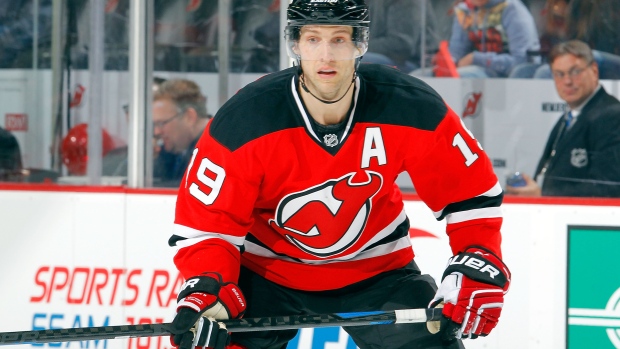Sep 29, 2015
About those Travis Zajac trade rumours…
Veteran centre's huge contract and stagnating offensive numbers should be major red flags for the Toronto Maple Leafs, TSN's Travis Yost writes.
By Travis Yost

This past weekend, rumours swirled about Toronto's alleged interest in New Jersey Devils centre Travis Zajac. The connection here is obvious. Zajac, a former first-round pick in 2004, was drafted and developed by none other than new Leafs general manager Lou Lamoriello.
For a team mostly devoid of talent right now, it's understandable why the beggars-can't-be-choosers crowd fanned the flames of this trade rumor. The Leafs have a huge hole down the middle of the lineup, and Zajac's been, at the very least, a pillar of stability for a New Jersey team venturing into a rebuild.
That's perhaps the only defensible point of this proposed trade. For starters, I can't see how Zajac fits into Toronto's plans either – he's a 30+ veteran with a massive contract, both in terms of average annual value ($5.75 million) and dollars owed ($28.75 million) through the 2020 season.
The dollars remaining strikes me as a major red flag – even for a Leafs organization with plenty of cap space and an infinite pool of resources. Assuming that New Jersey is looking to get out of Zajac's deal before things get really dire in his older years, it's hard to believe they'd dump him for little in return. If Zajac's truly on the market, they'll be looking for the usual top-six centre haul – a combination of picks and prospects commensurate to his perceived value as a steady two-way pivot with plenty left in the tank.
On the red flag point: I'm increasingly concerned about the stagnation of Zajac's offence. No doubt the system he has played in for years has suppressed offence to some degree, but it hasn't stop players like Ilya Kovalchuk, Jaromir Jagr, and Patrik Elias from having impressive scoring totals in recent years. For whatever reason, it seems increasingly clear that the days of Zajac being an offensive presence – his high-water mark of 67-points was back in 2009-2010 – are a thing of the past.
It can't be overstated enough how much his offence has dried up in the years. And to illustrate this point, I went ahead and grabbed a bunch of similarly-situated centres. Many of these players have reputations of being two-way types – guys who add real value on the defensive end that may, in some way, suppress their ability to produce at the offensive end of the rink. A couple of other names I floated in because they're actually UFA (like Derek Roy) or teammates (like Adam Henrique).
The table below is reasonably simple. It's a five year Point/60 number for each skater, or how many points we have seen them tally in every 60-minutes of action. The far right column is the most interesting to me. It includes the results of a simple t-test. The t-test is used to check whether two sets of data (in this case, each player's game-by-game scoring rates) differ significantly.
There, I noted the players who we can say with 95 per cent confidence are better scorers than Travis Zajac.
Zajac Comparables
| Player | $M Remaining | Pt/60 | 95% Confidence? |
|---|---|---|---|
| Nick Bonino | 4 | 1.74 | Yes |
| Bryan Bickell | 9 | 1.7 | Yes |
| Derek Roy | UFA | 1.63 | Yes |
| Matt Cullen | 0.8 | 1.62 | Yes |
| Martin Hanzal | 7 | 1.54 | -- |
| Tyler Bozak | 13.5 | 1.51 | -- |
| Sean Couturier | 25.9 | 1.46 | -- |
| Antoine Vermette | 7.5 | 1.44 | -- |
| Vernon Fiddler | 1.5 | 1.43 | -- |
| Adam Henrique | 19 | 1.42 | -- |
| Kyle Chipchura | 1 | 1.35 | -- |
| Marcel Goc | UFA | 1.32 | -- |
| Travis Zajac | 37.4 | 1.25 | -- |
These players have a number of things in common. One, they've played hundreds of games over multiple seasons. Two, they all have out-scored Travis Zajac at 5-on-5 over the last five years. Three, none of them have even a shred of a reputation as offensive threats. Many of them, I would submit, have been labeled and discarded as limited attackers.
The top-four skaters are almost certainly better scorers than Zajac at this point in his career. It's worth pointing out that the combined liabilities for these four players is just $13.8 million – roughly 37 per cent of what's owed to Zajac by New Jersey. In a league where scoring drives salaries, there's a reason why there's not a lot of money committed to the likes of Bonino, Bickell, Roy, and Cullen, and that's because they're not very strong offensive producers. Which raises the question: just how badly did New Jersey miss on Travis Zajac?
There are a bunch of other skaters filling out the list who have out-scored Zajac over that same stretch, though we are less confident in our conclusions there. It's a weird collection of names – Tyler Bozak's contract is terrible, Sean Couturier's never produced much of anything offensively, Vernon Fiddler's nothing more than a checking centre with increasingly limited offensive zone touch. And yet, again, they all have beaten out Zajac offensively.
The Takeaway
Points aren't everything, and it is worth mentioning that Zajac's underlying numbers are quite alright. But when you have diverted a significant portion of your team's available cap resources to a forward, you anticipate he will be a presence on both ends of the ice. Zajac has failed to live up to expectations in the offensive end, and for a Maple Leafs team that was starved for 5-on-5 goal-scoring last season, that matters quite a bit. It's best we put this rumour to bed for good.


